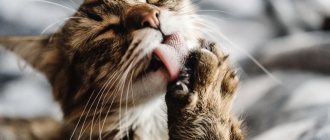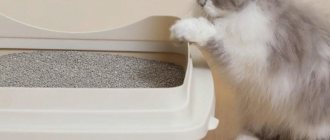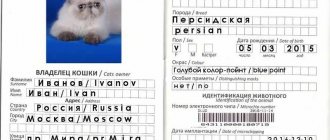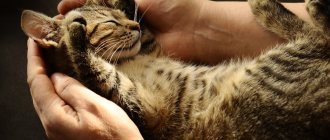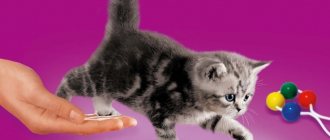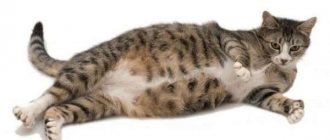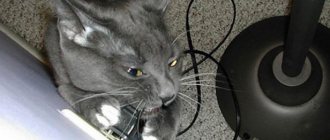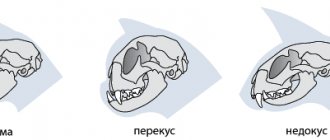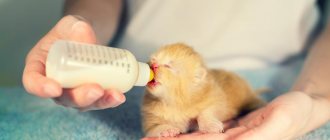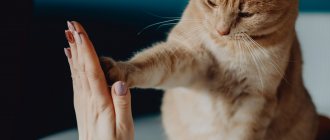Reasons for the habit
A deviation in pet behavior in which a cat sucks or licks clothes, blankets, carpets, its own fur or the tail of another animal is called “sucking syndrome.”
Veterinarians identify the following factors influencing the appearance of the habit:
- The kitten was weaned from its mother before 8 weeks. The problem arises due to lack of care and concern on the part of the cat.
- Various diseases. These include brain tumors, diabetes mellitus, anemia, lack of vitamins and minerals, leukemia, and immunodeficiency virus.
- Stress suffered by animals. Separation from the owner, moving to another apartment, the birth of a child, divorce, unsanitary conditions can lead to such deviations in behavior even in adults.
- Lack of attention. In this way, the pet tries to attract the attention of its owners.
- Sedentary lifestyle. The addiction occurs in cats that do not go outside. Due to lack of stimulation and physical activity, the cat becomes bored and thus seeks care and attention.
- Breed. Scientists have proven that cats of oriental origin are prone to bad habits.
Timing and general information about feeding kittens
Kittens learn to suck while still in the womb. By the time of birth, babies have only one mission: determine the direction using scent and crawl to the food source. The first sips of colostrum help populate the intestines with microflora so that the kitten can digest food. Within 2-3 days, kittens receive colostrum, after which the cat begins to produce milk.
Cat's milk gives kittens all the necessary nutrients and antibodies - temporary immunity. The duration of feeding is regulated by the cat; some mothers feed their babies until the 15th week. Most often, a cat begins to avoid kittens or not let them suckle at 8–12 weeks. Until 12 weeks of age, it is advisable not to interfere with the feeding process of kittens!
If the pet abandoned the kittens earlier, they need to be artificially fed. Kittens are regularly weighed; if any baby is underweight, he is supplemented with formula. In a non-multiple litter, there should be enough milk for all the babies. If there are 6 or more kittens, usually 1-2 of the last born kittens will need supplementation.
At about 3 weeks of age, kittens begin to become interested in the smells of adult food. If kittens are bottle-fed, complementary feeding can be started at 2 weeks. By the way, at the 3rd week of life, the kitten starts teething, which can cause serious inconvenience to the cat. You need to think about this point in advance, gradually accustom the kittens to supplementary feeding, so that the main source of nutrition is not mother’s milk.
Why is it dangerous?
If the pet then starts eating the owner's things, the risk of intestinal obstruction increases.
First of all, it is necessary to find out the reason for this behavior of the pet in order to exclude serious diseases. If the animal is healthy, then the worst thing is when the cat goes from sucking things to chewing and swallowing them. Which can lead to blockage of the esophagus and intestinal obstruction, and such conditions often result in death. If the fabric is synthetic or contains toxic dyes, the animal will develop severe intoxication.
Why does a teenage kitten continue to exhibit a sucking reflex?
Brain development in cubs is directly related to mouth movements, and the sucking reflex turns out to be a very important element of psychophysiological development. The reasons for a kitten’s prolonged suckling period may be:
- . ” When keeping a cat family together, the nurse cat with a developed maternal instinct turns out to be too caring, meekly enduring the attack of energetic teenagers and the unpleasant grabbing of the nipples by toothy mouths. Sometimes a selfless mother continues to feed an over-aged child at the same time as the subsequent newborn offspring.
- Early weaning or artificial feeding . In this case, the suckling kitten considers a person to be the closest creature, associating with him not only the provision of food, but also a blessed feeling of security and tranquility. Falling asleep in the owner's bed, a well-fed and satisfied baby can begin to lick and smack any part of the owner's body. Cubs, accustomed to receiving food exclusively from human hands, will stick to their fingers when they feel hungry.
- Lack of attention on the part of the owner, frequent loneliness, boredom . Not finding a more suitable object to splash out its emotions, the kitten will cuddle and cling to a soft toy or fur item.
- Stress, nervous shock . Instinctive memory indicates that the safest place is next to the mother in her own den, so the fear experienced can psychologically turn a teenage kitten into a three-week-old sucker. Having disconnected from the scary outside world, the baby animal uses the sucking reflex as an effective antidepressant, relaxing with the help of a kind of “self-hypnosis.”
- Breed predisposition . It has been noticed that young Siamese, Thai, Persian, Asian cats, as well as their crosses, often suck and chew things.
- Underfeeding, lack of vitamins and minerals . Unbalanced feeding can lead to licking, chewing and swallowing of inedible objects. So, experimentally the body tries to compensate for the deficiency of certain ingredients. In particular, if there is a lack of minerals, the cat will choose the walls or taste the soil from flower pots. The desire to suck on woolen items is due to the content of lanolin in them, which has a similar chemical nature to lipids and fatty acids. Naturally, the habit of eating inedible objects has a detrimental effect on the cat’s body, causing clogging of the digestive tract and increasing the likelihood of poisoning.
- Disturbances in the functioning of organs and systems . Constant licking and sucking can provoke functional disruptions in the body, leading, for example, to increased salivation and nausea. In turn, this may be a sign of poisoning, internal intoxication, diseases of the oral cavity, teeth, and digestive tract. A persistent desire to lick a part of one’s own body may be associated with dermatitis, a manifestation of a skin allergy caused by a wound.
How to wean it off?
In order for a cat to stop sucking a blanket, the very first thing you need to do is eliminate or reduce the number of objects around that can be used for sucking. No source, no problem. You can repel with a spray bottle of water or aromatic oils with citrus scents. Veterinarians also insist on conducting a full examination and identifying possible causative diseases or complications. If a deficiency of nutrients and vitamins is detected, the cat is prescribed a special diet.
It is important to distract the student from unwanted games. Especially important are those that will develop trust between the purr and the owner. When you see your pet doing an obscene activity, you need to distract him for at least 10-20 minutes so that the cat’s brain has time to switch. At the end of the game, you can pet the animal or offer it a treat. Then he will enjoy the entertainment, and not from sucking on the blanket. It is important to provide the child with toys that will not let him get bored during the day when the owners are at work.
Breeders remind you that care should be taken to have several scratching posts, high shelves or a whole complex. The tray and feeding area should be kept clean. Then the animal will feel comfortable and safe. You should never punish or beat someone for bad behavior or strange habits. On the contrary, you need to surround your pet with care, affection and attention, then he will not have the desire to attract attention to himself by sucking on the blanket.
My cat licks and chews my wool sweaters
My cat licks and chews my wool sweaters. Maybe she is lacking some nutrients? Most likely no. Some cats have an impulsive urge to lick, suck, or chew things. Most often this is wool, but some cats prefer human hair, plastic bags, cardboard or shoelaces. If a cat is fed a high-quality diet, is energetic, has healthy skin and a shiny coat, then it is highly unlikely that this behavior is due to a nutritional deficiency. However, there are several medical conditions such as anemia or diabetes that may be responsible for this behavior. So it’s a good idea to take your cat to the vet to rule out medical problems.
What are the reasons for this behavior? Nobody knows for sure. Perhaps both heredity and the earlier weaning of the kitten from its mother play a role here. Most often, this behavior occurs in cats of oriental breeds (Siamese, Burmese, etc.) or their crosses. This suggests that this behavior occurs at a genetic level. Kittens have a very strong sucking instinct. Oriental breeds have a longer period of feeding kittens than other breeds. Breeders usually wean kittens from a cat at the age of 6-7 weeks, and it is possible that a short period of feeding affects the subsequent behavior of cats of Oriental breeds.
Cats of other, non-Oriental breeds usually have a shorter natural nursing period, and when a kitten is weaned from the cat at the age of 6-7 weeks, this is not a problem for him. However, if such kittens are taken away at an earlier age (for example, due to the death of the mother) they are more prone to this behavior. Often this behavior does not appear until the kitten is several months old, and for many it goes away by 2 years of age, although for some the habit remains for life.
Is this behavior dangerous? In some cases, cats not only suck and lick objects, but may also swallow pieces of plastic or fabric. Sometimes these particles pass freely through the gastrointestinal tract, but there is always a chance that they can cause an intestinal blockage. Cats that digest large amounts of hair are more prone to developing hairballs. In many cases, this habit is annoying for the owner, but is not dangerous for the cat. Call your veterinarian right away if your cat has vomiting, diarrhea, refuses to eat, or becomes lethargic.
Is it possible to wean a cat off this? Sometimes, as cats mature, they stop behaving this way. You can try softly flicking your cat on the nose and saying “no” as soon as she tries to behave this way. You can spray it with a water bottle. For greater effect, this should be done immediately after the cat starts licking. It is also necessary that the cat does not have access to those things that she likes to lick or chew when the owner is not around and there is no one to stop her. Keep clothes in closets where your cat can't get into. Some people whose cats like to lick their hair have to wear a hat to sleep at night.
Has anyone tried putting hot sauce or something non-toxic but bad tasting on things that your cat likes to lick. Some people believe that if a cat is allowed to lick one thing, that will be enough for her, and she will not touch other things. In some cases, giving your cat chewable dog toys or high-fiber dry food may help.
It is important to make sure your cat gets enough exercise. If possible, play with your cat several times a day. Provide a stimulating environment for your cat using toys, a fish tank, bird feeders, or a special cat video.
In some cats, this behavior becomes overwhelming, and in these cases, medication may be tried. Clomipramine, fluoxetine, and amitriptyline are commonly used. They are prescribed by a veterinarian. It may take weeks or months for the effect to appear, the dosage may need to be changed, and there may be side effects. Talk to your veterinarian or animal behaviorist if you think medication will help your cat.
Copyright holder © Zooclub portal (www.zooclub.ru)
Correct Methods
You will notice when it is time for the kittens to be weaned from their mother. The cat will begin to get irritated and hide from the children. Most often this happens at the teething stage, since sucking kittens begin to cause noticeable discomfort to the mother. During the teething stage, kittens will begin to become interested in the smells of food and this interest should be encouraged.
Do not forget that while suckling, kittens receive not only food, but also close contact. Insecure kids may be drawn to a cat because they are scared or feel weak. Before you take any action, make sure the kitten is looking for the nipple. Many babies simply bury their faces in the fur, trample their mother’s belly with their paws and purr - this is one of the forms of close communication.
Kittens over 18 weeks of age need to be distracted from the cat and the suckling process. You can do this in several ways:
- Distraction by play
- a three-month-old kitten can be easily distracted by a noisy toy or the smell of a treat. If you see that your cat is irritated and trying to get away from the kittens, try to distract them.
- Affirmation of importance
- when you begin to treat the kitten with due respect, perceive its desires (to play, to sleep), it establishes itself as a person and becomes more confident. In most cases, this process is invisible, but some sensitive babies need support.
- Retraining is a two-step method
. The kitten is first accustomed to a nipple (a bottle of milk), then to a saucer of milk.
Important!
During the process of weaning kittens from their mother, you should not remove the nest. It is better to provide the cat with another safe place, but do not deprive the kittens of the shelter to which they are accustomed.
Kittens under two months of age
There is no need to rush to take home a baby at the age of 1-2 months. This is not the best time to part with your cat. In the period up to 2 months, kittens acquire important skills. A well-mannered mother teaches her kids:
- use a scratching post rather than upholstered furniture;
- go to the litter box;
- use claws and teeth for their intended purpose;
- eat complementary foods;
- Follow cat hygiene rules.
It may seem that the owners can teach all this. But experts rightfully claim that cats are much better at this upbringing. The kitten learns all these rules without stress and learns them better.
There are also anatomical features that prevent kittens from being weaned at the age of 2 months. At this time, babies are vaccinated to build immunity. But the protective system does not strengthen immediately. This requires 2-3 weeks. The process is faster and better if the kitten is with its mother and receives an additional supply of antibodies with her milk.
Possible health problems
Significant problems can also arise with the health of a pet that is separated from the cat for up to three months. During this period, the most important processes in the formation of organs and systems take place. The presence of breast milk eliminates the deficiency of essential minerals, vitamins, and other microelements. This allows the digestive system to establish the production of enzymes necessary for food processing, gradually, in a normal manner. A kitten that begins to eat regular food before the age of three months may experience various disruptions in the gastrointestinal tract. This often becomes the cause of chronic diseases.
It is known that cats have good health; their bodies cope with many diseases on their own, without medical help. These qualities are ensured by the strong immunity that nature provides to animals. The body of a newborn kitten is practically deprived of this natural defense and cannot produce antibodies to fight pathogenic microbes and bacteria. They come to babies from mother's milk. If kittens are deprived of this source too early, immunity does not have time to form and strengthen. Consequently, a favorable environment is created for the development of infections and inflammations.
Veterinary pharmacology includes vaccinations to strengthen the natural defense system. But they can only be done at 2 months. After this, the kitten remains defenseless against these aggressors for some time; it still requires help in the form of mother's milk. Therefore, babies who were taken before three months often get sick.
How to wean kittens from their mother cat
Sometimes it happens that older kittens, who receive complementary food and can eat on their own, continue to suckle the mother cat even when she no longer has milk.
Important! If you do not wean the kitten from sucking the cat in time and the caring mother does not drive the baby away from her, this will turn into a habit that is quite difficult to get rid of.
As an adult, the kitten can “suck” your things, hair, fingers, and other objects. Therefore, it is very important to develop a chewing reflex in a kitten.
If this period is prolonged, you need to gradually wean the kitten from sucking the cat and do this very simply:
- Separate the kittens from the cat for a period of time every day. Move the kids to another room for a while.
- Provide cats with bowls containing cat milk replacer.
- Lightly poke your pet's muzzle into the bowl, or dip your finger in the milk and let your baby lick it.
- Repeat the procedure several times.
To help kittens get used to it faster and not experience stress, talk to them in a gentle tone and interest the kids in interesting toys.
The isolation time should be gradually increased, but while the kittens are accustomed to independence, the mother cat should continue to feed them milk.
Over time, the kittens will understand that there is another source of food besides mother's milk and will stop sucking from their mother cat. If you do everything correctly, after about three to five days, babies will begin to happily drink milk from bowls themselves. The main thing is that when teaching kittens to feed on their own, act carefully and consistently. Don't poke your kitten's muzzle into the milk too often. The baby may choke or get scared.
If kittens do not go to bowls, give them milk from
a baby bottle
. If the babies are well-fed, they are less likely to start sucking on their mother cat. Milk and baby formula that you give to small pets should be warm, at room temperature.
Important! On many forums you can find advice where users recommend lubricating the cat's nipples with bitterness, camphor oil or alcohol. Such events can not only negatively affect the digestive tract of babies and provoke severe poisoning, but also on the condition of the nursing cat.
The nipples of a lactating female can be lubricated with camphor oil in case of false pregnancy, the birth of stillborn kittens, excessive milk production, if the cat gave birth to two or three kittens and they were separated from their mother early, or with mastitis. In this case, the best remedy that will help stop lactation will be suggested by a veterinarian.
To wean a kitten from sucking a cat, put a blanket made of soft, sterile material on your pet.
In pet stores you can buy special clothes that cover the sides and tummy of the cat. When doing this, make sure there is no milk in the milk cartons. Otherwise, you can provoke mastitis (inflammation of the mammary glands).
Make sure that all the kittens are well-fed, distract the pets from sucking the mother cat with various toys. At this age, healthy babies are incredibly inquisitive and active.
If all of the above methods did not help, and the kitten stubbornly continues to suckle the cat, consult a veterinarian. The specialist will select the most effective and safe method for solving this problem for cats and kittens.
15.01.2018
Is it possible to wean a kitten from the sucking reflex and is it necessary to do so? The sucking reflex is an unconditioned instinct that allows newborn mammals to survive. Blind, newly born kittens have only one goal - to find the mother's nipple and extract colostrum from it. What to do if the baby is too attached to his mother, when is the best time to introduce complementary foods and what methods of weaning from the cat can be used. Let's look at it in more detail below.
